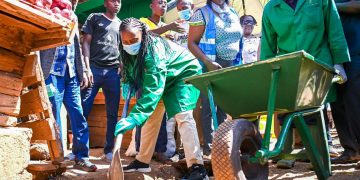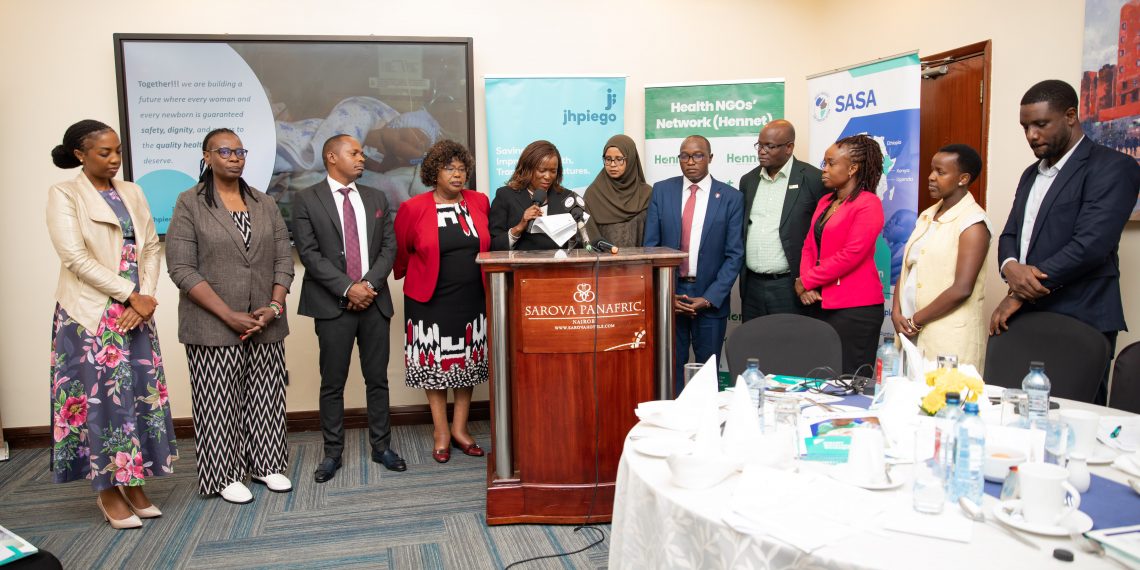Kenyan Members of parliament are advocating for increased investment in neonatal healthcare as persistent gaps in healthcare continue to undermine progress in lowering newborn mortality rates. The appeal was made during a High-Level Parliamentary Sensitization Forum on Reproductive, Maternal, Newborn, Child, and Adolescent Health and Nutrition (RMNCAH+N), convened by Jhpiego in collaboration with the Health NGOs Network (HENNET).
The meeting brought together members of Kenya Women Parliamentary Association (KEWOPA), Doctors, and development partners to discuss systemic issues in healthcare and the crucial legislative and policy actions required to improve health outcomes for children especially Neonates.
During the meeting, Jhpiego Country Director, Paul Nyachae, presented a somber assessment of child health in the country, highlighting that Kenya is expected to see the loss of 33,000 children this year alone.
“Our children are dying from preventable causes. Many are dying because of prematurity, lack of oxygen, and infections these are the top three killers of our children,” he said. “When you look at these issues, we can do a lot to change the situation.”
According to data from Kenya Demographic and Health Survey (KDHS) 2022, progress on eliminating neonatal mortality has stalled, as between 2008 and 2014 the country saw a 29 percent reduction, which was significant compared to progress made between 2014 and 2022 which showed a 5 per cent progress.
Kenya’s neonatal mortality rate currently stands at 21 per 1000 live births against the Sustainable Development goal (SDG) 2030 of 12 per 1000 live births.
In a joint statement read on behalf of the chair of KEWOPA Hon.Leah Sankaire, the women parliamentarians acknowledged the progress made by the government in maternal health, they however warned that the child risk being left behind.
The group also lauded the progress recorded in KDHS 2022 that shows the fall of maternal mortality from 362 deaths per 100,000 live births in 2014 to 355 in 2022, and the increase in births attended by a skilled personnel to 97 percent, but warned that newborn survival has been left behind.
“We recognize that while investing in the life of the mother is critical, it is equally important to invest in the life of the newborn. Every mother and every child deserves equitable access to quality, life-saving care.”
Consultant Pediatrician, Neurologist Dr. Supa Tunje, echoed these sentiments, warning that systemic weaknesses continue to undermine newborn survival.
“The majority of babies die within the first seven days of life due to complications during pregnancy or delivery. When a baby does not receive immediate care in a well-equipped newborn unit, their risk of dying increases,” she said.
Dr. Tunje who is also the President of the Kenya Pediatric Association raised concerns about the unequal distribution and limited number of neonatal care units across the country. Currently only 37 per cent of health facilities in Kenya provide full emergency obstetric and newborn care, this coupled with staffing shortages, frequent drug stock outs, and limited equipment continue to hinder quality service delivery driving neonatal mortality across the country.
“We do not have enough neonatal units, and even the few available are concentrated in a handful of counties or at national referral facilities. A neonatal unit is not just a space with a cot it requires proper infrastructure to provide appropriate care.”Dr. Tunje said
Flawed Benefits package
MPs also raised concerns about the Social Health Authority (SHA) benefits package, arguing that it is undermining efforts to improve neonatal outcomes. They pointed out that the current scheme bundles newborn care together with the mother’s package and excludes essential services such as postnatal care, neonatal intensive care (NICU), and oxygen therapy.
“Care and tariffs for the newborn have been bundled with that of the mother, limiting comprehensive care,” MPs noted. “County maternal and newborn health programs remain underfunded, and delays in budget releases continue to affect outcomes.”
The Kenya Women Parliamentary Association (KEWOPA) urged immediate reforms and expansion of SHA coverage to include postnatal care up to 28 days and life-saving interventions such as routine immunization, phototherapy, oxygen, and intravenous fluids.
On their part KEWOPA members pledged to champion for maternal and newborn health.
“KEWOPA commits to advocate for the expansion of SHA coverage for newborns and the allocation for the establishment and operationalization of NICUs across all 47 counties.”
The stakeholders noted that if Kenya is to realize its SDG 2030 goals, the country has to prioritize newborn care in both policy and budgeting.













